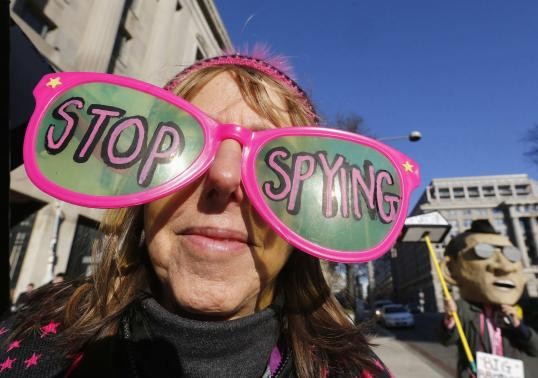
US President Barack Obama announced Friday that the United States will not curtail the NSA surveillance program that sparked an international uproar after they were exposed by whistleblower Edward Snowden.
The President, however, said that the post-9/11 surveillance will be modestly constrained and that spying on leaders of US allies will be completely banned.
National Security Agency leaker Edward Snowden revealed last year that the government forces phone companies to turn over billions of Americans phone calls and stores them.
Obama, on his much anticipated announcement on Friday, said that NSA will continue collecting the data but the government will set up a new non-government entity to store them.
"We have to make some important decisions about how to protect ourselves and sustain our leadership in the world while upholding the civil liberties and privacy protections our ideals and our constitution require," he said in a speech at Justice Department headquarters.
"Regardless of how we got here, the task before us now is greater than simply repairing the damage done to our operations or preventing more disclosures from taking place in the future," he added.
According to Obama's new proposals:
- The government will require getting approval from a judge before it searches the data, except in emergencies.
- NSA will continue to monitor foreign terror suspects' email accounts, but will restrict use of data about Americans inadvertently caught in the dragnet.
- The government will establish a panel of public advocates who will appear before the court in high-profile cases.
- There will be a complete ban on snooping on allied leaders but the ban will be lifted if it is critical to national security.
Obama's address was designed to fend off concerns that US surveillance has crossed the limits, but the president's measures fell short of dissolving the spying programs altogether, much to the dismay of Americans.
Even as White House was implementing the final tough on the minor changes that was to be announced Friday, media outlets reported that the NSA gathers nearly 200 million text messages a day from around the world and has installed backdoor software in almost 100,000 computers that allows spying on the devices.
A semblance of relief came in when Obama promised that the United States will not eavesdrop on the heads of state or government of close US friends and allies, "unless there is a compelling national security purpose." The step will be perceived as a measure to mend US's relations with countries like Germany, after reports surfaced that the NSA had spied on German Chancellor Angela Merkel's phone calls.
But, closer home, American's will still be left with a sense of incompleteness faced with the fact that the spate of phone tapping that has been going on will not cease to happen.

















